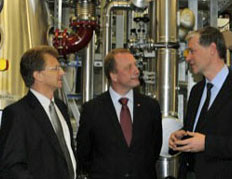 Norwegian biofuels company Weyland has opened a pilot plant for second generation bioethanol in Bergen, Norway.
Norwegian biofuels company Weyland has opened a pilot plant for second generation bioethanol in Bergen, Norway.
According to a company release, the plant was formally opened today by State Secretary Per Rune Henriksen of the Norwegian Ministry of Petroleum and Energy during an opening ceremony. The pilot plant has the capacity to produce 200,000 litres (about 53,000 gallons) of bioethanol per year. Petter Bartz—Johannessen, Weyland’s CEO, considers the opening an important milestone for the company: “Weyland aims to become an international supplier of technology for production of bioethanol from cellulosic feedstocks. The pilot plant will allow us to demonstrate the technology’s suitability for full-scale production.” The Weyland process is based on concentrated acid hydrolysis that officials say results in a high ethanol yield and can utilize a variety of different feedstocks, such as wood and agricultural waste.

The company hopes that the pilot plant will pave the way for a larger production plant in Norway, with an annual production capacity in the order of 25-30 million litres.
The photo, supplied by the company, pictures left to right: CEO Petter Bartz-Johannessen, Weyland BioEthanol, State secretary Per Rune Henriksen, Norway Department of Oil and Energy and Leading business developer Guntis Aboltins-Abolins, Statoil New Energy at the opening of Weylands pilot plant.

